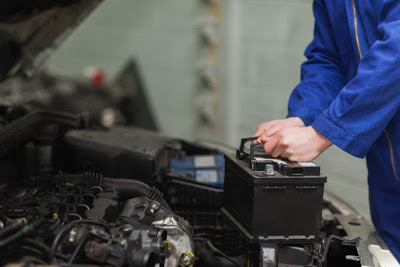 Car troubles rarely happen at a convenient time and when they do, there’s a good few of us that’ll struggle to diagnose the problem at hand. And when two different car issues have very similar warning signs, how can you determine what the cause is?
Car troubles rarely happen at a convenient time and when they do, there’s a good few of us that’ll struggle to diagnose the problem at hand. And when two different car issues have very similar warning signs, how can you determine what the cause is?
Almost all of us have experienced a dead car battery or failing alternator. And finding which one needs to be replaced can be hard when you don’t know what to look for. From flashing engine and warning lights to having trouble starting your car, there’s a few cautioning signs to look out for that may indicate either your car battery or alternator is on the fritz.
1. Warning Lights on Dashboard
The complexity of cars these days usually means that your dashboard has the potential to completely light up like Christmas when there’s a problem. Modern electronic system and monitoring sensors are constantly self-testing to monitor how your vehicle is behaving and it’s important to know which warning light signals require immediate attention and which ones can wait.
The light that symbols a battery can illuminate when you first start your car up, but if it doesn’t vanish after a few seconds it can mean there’s a problem with your cars electrical system. A faulty alternator and a faulty battery are two leading factors for this light staying on after the engine starts. Because the alternator is responsible for charging the car battery, the ‘battery light’ can flicker at the early onset of alternator problems or be a warning signal to inform you the alternator’s output has dropped below the pre-set limit of around 13-14.5 volts. If the alternator isn’t working to its full potential, the voltage will shift and set off the warning light.
2. Flickering or Dimmed Lights
One of the first early warning signs your battery is failing is flickering or dimmed lights. This can be your car’s dash lights, headlines and internal. Drivers may notice extremely bright or erratically dimming headlights because the alternator has stopped supplying the vehicle’s electrical needs. Power windows may start to stop working properly and speedometers can stop working completely, depending on how far failed the alternator and battery are. As the alternator stops producing as much power to your vehicle and its accessories, you’ll notice these signs warning you the alternator is on its way out and you’ll need to arrange an alternator repair.
To eliminate the battery being the problem, which is fairly likely the case if your interior car lights keep dimming, you can check the battery voltage with a voltmeter. When the engine is turned on, 13-15 volts is normal for a healthy battery. If the battery won’t keep charge it usually means the problem lies with the alternator not sending enough power to keep it running.
3. Weak or Dead Battery
One of the notorious signs for a weak or dead battery is your car’s engine cranking, but not starting. If your engine turns over when you turn the key but doesn’t actually start, this is sure sign your battery is on its way out (or failed already). You can jump start your vehicle with jumper cables at this time and let it run for 30-60 seconds to allow the alternator time to charge the battery again.
Whilst your vehicle may keep running for a day or two, it’s still recommended to replace the battery as it’s only a matter of time before you’ll get stuck again. Other warning signs that your battery is failing is when it’s fine one day then the next it’s not; and keeps going into a vicious cycle of being very unreliable. This can also be a warning sign the battery cables are lose or not connecting properly. If the alternator is producing electricity but it’s not charging the battery accordingly, wire connections can be broken and should be checked.
4. Sounds and Smells
Abnormal sounds and smells coming from your car can be a big indication that something isn’t working as it should. Just before an alternator fails, it’s common for drivers to hear a growling or whining noise. This is because the alternator is driven by a belt and a pulley. If this isn’t correctly aligned or failing, the growling sound will indicate a problem.
The smell of burnt rubber can also mean alternator failure. If the belt and pulley aren’t working properly, the friction between the two can cause heat and that smell of burning rubber and should be replaced as soon as possible to avoid other problems.
Author Bio
This article is written by Jayde Ferguson, who writes for Autospark – Perth’s leading auto electrician for alternator repairs. You can catch Jayde on Google+ to discuss this piece.

